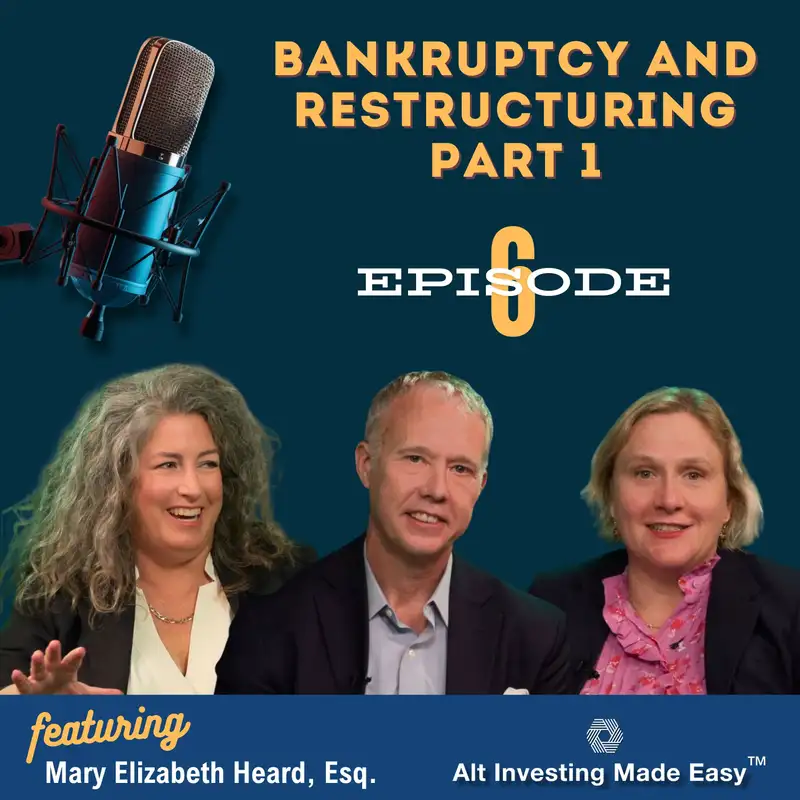E6: Bankruptcy and Restructuring (Part 1) featuring Mary Elizabeth Heard, Esq.
ME:
America's always run on small businesses, right? So mom and pop shops, sole proprietorships, that is the bedrock of our economy.
R:
Welcome to Alt Invest and Made Easy, where we explore the complex world of alternative assets. I'm Rowan, a securities attorney, investment advisor, and your co-host.
S:
And I'm Sarah, an investment advisor and corporate attorney and your other co-host.
We'll guide you through real estate, private equity, and more, making complex topics accessible. Tune in for insights that empower your financial journey. Let's make Alt Investing easy, one episode at a time.
Hello, everyone. Welcome to Alt Investing Made Easy. We're glad you're back with us. And today we have our friend and colleague who is an expert bankruptcy practitioner and a lawyer, Mary Elizabeth Heard. Hello. Welcome, Mary Elizabeth. Thanks for joining us today.
ME:
Thank you. I'm so glad to be here.
EM:
You know, we had a conversation initially about having you on as a guest and our other law partner that will be one of our other first guests, Eddie Martin. Eddie's area is public security. He's an expert with respect to public companies and their equity securities and debt too. But with your expertise in the area of bankruptcy law, we kind of feel like that's very relevant as well for any company to consider from an investment standpoint, you're making investments based on valuations. Those valuations are determined by reference to the company's capital structure, their debt and their equity. But if you don't really understand the bankruptcy laws, then you might not be able to, you might not be taking advantage of all the opportunities for, are opportunities with the bankruptcy law that should be fully understood by any business owner that's got up to a significant size. And this can apply also to, like we were talking about yesterday, the single asset syndications. But anyway, I should shut up and...
S:
Well, I think exactly. We're really grateful to have you here because there is a relevancy to our investors and promoters of deals that we are speaking to as an audience. It's important to know about, maybe one could say the other side.Roland Wiederaenders (02:22.286)
what happens. And so we're going to get into a lot of details about all of these things. And let's just let's start right in. So why don't you introduce yourself and then we'll talk more about what bankruptcy is and other details.
ME: Sure. So Mary Elizabeth Heard, I'm a, I don't know how many generation, I think at least eight generation Texan. My family's been here a long time. In fact, we have lawyers going back to, I think, 1866.
that we can be sure every generation. My sister's also a lawyer. Anyway, she's also a bankruptcy lawyer. So my background is other things first. Then I went to law school in my 30s.
S:
We share that in common.
ME:
That's right. We were actually both in the class of 07 at the University of Texas. I was undergrad plan two at Texas. So- We were all at school together actually. just didn't know each other. Yeah, university, that is. the University of Texas. And after law school, I went to San Francisco and joined a large firm, Latham & Watkins, in San Francisco and practiced bankruptcy law. I also did some work in litigation, and I'll talk later about how bankruptcy encompasses pretty much all areas of law. You touch everything, it seems like. certainly transactional work is encompassed in in securities work.
So after that, I went to Aitken Gump back here in San Antonio, and I...I continued practicing bankruptcy and then went out on my own and now I'm here at Grable Martin and I'm thrilled to be here. It's a perfect firm for what I do. So to answer a little bit about what bankruptcy is and why you should care, I love bankruptcy law. My spouse is always telling me that maybe I'm a little too interested in this topic because it's kind of, you know, a lot of people have a view of bankruptcy law and of bankruptcy being a very negative process, that it's punitive in some way. And so I certainly want to start with that, that I want to dispel any rumors. It doesn't mean you're bad if you take a company through bankruptcy. And that leads me to my next point, which is there is more than one, there are a bunch of different kinds of bankruptcy, but for our purposes today, you can think of them in two categories. First, Roland Wiederaenders (04:46.658)
liquidations, which is typically associated with what we call chapter seven of the bankruptcy code, and chapter 11, which applies to usually reorganizations. For our purposes, we are not really addressing consumer bankruptcy as much, but you can as an individual file a chapter 11, and certainly you can file a chapter seven in corporations, partnerships.LLCs, can talk about all that and how they're considered in a bankruptcy. But business bankruptcies are thought of, these large ones you see in the news are typically Chapter 11s.
And those are reorganizations. And so when we talk about a reorganization, we're talking about addressing a problem in the capital structure, a maturity date, perhaps an impending foreclosure or other liabilities, other sometimes tort liabilities. And so that's when people get into this concern of, filing bankruptcy is bad. Well, it's not bad.
S:
Right, right. It's actually really important if you're an investor, you need to understand what could happen in a bankruptcy because it's going to impact on you and your investment decision and because it'll determine where you end up at the end of things if things don't go well, really.
ME:
That's right. And so, for example, and I'm not in any way making these statements in a political way. But there are two people who've been in the news a lot with the word bankruptcy in the same paragraph. And so one of them is Donald Trump. Donald Trump, people will say, he's filed all these bankruptcies. Well, he has never, to my knowledge at least, been a individual debtor in a bankruptcy case. He's taken certain businesses through the bankruptcy process.
And conversely, another big name we know is Rudy Giuliani in New York. He's been in the news recently for having filed an individual bankruptcy case, which I think has been dismissed, but I'm honestly not following it. anyway, so there's this idea of, are we here? How did we get here? business in America is, if you can sort of...Roland Wiederaenders (07:06.942) I need a very broad brush. In America, our policies largely reward innovation. Right. So if you think about Silicon Valley, New York, Texas, certainly, and I'm not singling those out. Of course, there's innovation in every state, but we associate this sort of iteration of, especially technology companies in the last...probably since the late 90s, there's been a huge progress made in the tech world, right? Most recently, everyone's talking about AI, for example. So in order for us to have these rapid iterations, you have to move quickly and sometimes there's failures associated with those.
S:
You have to take risk, right?
ME:
You have to take a lot of risk. In this country, for example, a company might file bankruptcy because they were developing a, I don't know, a computer chip, right? And that computer chip was supposed to be the next big thing. Well, it takes a while to build a computer chip foundry, which is the big factory that makes the chips, right? Right, of course.
S:
And it's expensive, all the capital investment in such a project.
SF:
That's right, incredibly expensive and it takes a while. Well, I can think of one bankruptcy about 15 years ago that happened because essentially the technology went in another direction. There was really nothing that we could do to have foreseen that, so bankruptcy in that example gave an opportunity for this particular company to reorganize, sell off parts of the business. So if you have like, I'm trying to think, like if you sell both cars and motorcycles, you might want to sell the motorcycle part of your business. exactly. anyway, so that's an example. Then on the capital structure side, we often run into issues with maturity dates and interest rates, which is a big topic.
S:
Well, I was just thinking, you and I, just went to a conference together these last couple of days at UT, and one of the big discussions was about Roland Wiederaenders (09:34.956)
the cycle of the economy that we're in right now and the impact that the higher interest rates has had on, let's say, the real estate industry, especially for big projects and developers and all of their investors, which is a lot of our listeners or audience would probably be investing in real estate projects as private investments. So this is really relevant. And this is, you haven't yet seen that on the bankruptcy side yet, but there've been stirrings. What we've learned in the last couple of days is that there's been news or knowledge that, you know, this mismatch between interest rates, where they started a project and what they came to over the last few years, it's really impacted a lot of the value of lot of investments. And I don't know that we've seen a lot of bankruptcies yet, but this is what bankruptcy law is for, right? The bankruptcy process is - if it really gets bad out there and then you need to do a restructuring, this is the process that you go through, right? In terms of recovering some potentially if you're an investor recovering something or if you're project restarting and getting a fresh start. So this is, think, you know, well, and we've talked about democratization of capital before and how our investment laws, our securities laws allow for individuals even to start somewhere on the process of building their private wealth.
Well, in the background is exactly what you're talking about, which is this bankruptcy process that allows you to fail and pick yourself up again afterwards without anything too horrendous, really, mean, of course, a bankruptcy of a business is a terrible process for the people in the business, but it's also an available process. It's not missing, and it is missing in some parts of the world, by the way. So do you want to speak a little bit more to that, to this concept of the fresh start and how that can be really been that that's actually really important to support innovation, but also generally to support this huge part of our economy, which is private businesses.
ME:
Right. So I don't know the exact statistic, but my understanding is America has always run on small businesses. Right. Right. So mom and pop shops, sole proprietorships, that is the bedrock of our economy. So, but just to back up for a minute. Roland Wiederaenders (11:55.477)
We are seeing a lot of Chapter 11 activity this year, which is the area I'm focusing on for this discussion. In fact, complex bankruptcy cases, business bankruptcy cases, are extremely high this year. There have been a number of filings. And so one of the areas that I focus in, I'm often on the creditor side in complex bankruptcies, big, huge public companies filing for bankruptcy.
I did a lot after COVID, and we'll talk about that in a second. That can be an instigating factor that we obviously had no idea was coming. So in the oil and gas bankruptcies in Texas, I was in a bunch of those and the Chesapeake case. And then later Cineworld was another big public company, the movie theaters. And then I've been in a few others recently, the Zachary Construction case, for example.
But on the debtor side, I have mostly handled smaller cases, small business cases, medium-sized businesses. And specifically, I focus on real estate law as well. So my focus is bankruptcy. I do debtor side business and creditors. But specifically, there are single asset real estate cases or single purpose entities, that are treated a little bit differently under the bankruptcy code and have some accelerated timelines. And so part of what I do is focus in this sort of narrow trench or grouping of real estate focused cases. And I've done that both on the creditor side and on the debtor side. And we just wrapped up a case actually here in Austin, two cases here in Austin. So. the processes for the bankruptcy system are a little bit different than the regular state court system. So when people think of filing a lawsuit or criminal matter, usually those things are in state court. Well, our court system for bankruptcy is in federal court. And then without getting into all this legalese, we have what's called an order of reference for bankruptcy mattersRoland Wiederaenders (14:23.233) from the district court level, which is what I sometimes refer to as big kids court. But the district court level, the United States district courts will sort of refer all matters that are in the world of bankruptcy down to the bankruptcy courts. And the bankruptcy courts are technically Article I courts versus Article III courts. And all that means is they have...they're appointed for 14-year terms and not for life. There's some other differences, but basically they are specialized courts that just handle bankruptcy.
S:
And this is actually really beneficial, isn't it? Because that means that those judges are specialized. They're not dealing with general matters all the time across a broad spectrum. And so as a result, if you find yourself in such a court, you can at least assume there's a baseline expertise or like expert courts, kind of. And this is always, I mean, as anybody would...want in any legal case, but especially if you're dealing with an area of law that supports this when there really big problems that have to be either wound down or restructured, then it's good that there's a process that's actually separate from the normal court structure, I would think.
ME:
That's right. so not only are the bankruptcy courts specifically, how would I say this? Not single purpose, because there's certainly a lot of variety, but they are laser focused on the problems that are unique to bankruptcy. And so a bankruptcy court case starts with what we call the filing of the petition. And then there are, the reorganization context, all we're trying to do is get a plan confirmed, which is just essentially a restructuring of all the debt. All the assets and liabilities, and sometimes they also kind of, what we would say, in a sale process into that. So there's a variety, and we'll get back to what are the sale processes when we talk about the 363 sales. But essentially, you've got a very fast-paced system, the petition is filed.Roland Wiederaenders (16:42.559) And then within a day or two, there's a hearing set. we call that the first day hearings.
S:
That's amazing. And the reason I say that just for our audience is that I know that we have a number of clients who are from different countries originally. And you're here now in the United States have become investors, et cetera. And I just happen to know that about 25 year bankruptcies that can take place in other countries. And maybe you're waiting for that first case for years to even be heard, which of course means everything. The failures of the business just exacerbate because nothing can be done while you're waiting for this, right? So it actually needs to be fast in bankruptcy to help make, keep a problem from getting worse is what I think it would probably be.
ME:
Right, so you have a lot of different contingencies in play here. You might have employees who, if there's a cash shortage, how are we gonna pay the employees? Sometimes in a healthcare bankruptcy, we have a system to appoint an ombudsman, for example, to make sure all the people in this hospital or whatever is filing for bankruptcy that's related, if it's a retirement home, that their needs are taken care of and all the privacy things are covered as well. So it's a very fast-paced system where the point of this whole process, okay, is it goes along with America's goal to have innovation in business. So we use the term fresh start a lot. And what that means is for the business to be able to reorganize and get back out there and keep doing whatever it does best. And it may be reorganizing the debt maturities, reorganizing the capital stack. So what I mean by that is the secured debt and then the various tranches of unsecured debt.
S;
Right.
ME:
And the shareholder positions, and I'll get to that in a minute because I know that's something that will affect your audience. there is this, you know, the idea that if we can get through all of this and have this sort of shinier, more streamlined business to get going again, then it's good for...Roland Wiederaenders (19:04.749)American business.
S:
Of course.
R:
So I've got a question. mean, sometimes in bankruptcy, do debts just get answered? I mean, theoretically or in a reorganization, guess that's good. Could there be, I guess, a court order right off of debt? Is that the way it works or what really happens?
ME:
That's a great question. And I think that's a lot of what confuses people or even scares people about the bankruptcy process. So your typical investor in America is someone who has maybe retirement that holds equities, holds stocks and bonds, or they've bought stocks in public companies on their own. And so when a public company, we'll take that example, when they file for bankruptcy, they go through the same processes as a private company would. And so when the debt is restructured in what we call a plan, which is sort of the goal, and the plan is like a whole new contract that applies to everyone affected by the bankruptcy, including state governments, federal taxes, property taxes, debt instruments, everything in the capital stack, and vendor debts, and then shareholders. And we have this rule, again, I don't want to get too into legalese, but we have a rule called the absolute priority rule. And what that means is that only certain, each level of debt or ownership has to be paid in full in a certain order. So secure debt, I mean, there's some creative ways around some of this, but basically the way it works is secure debts paid first, then unsecured debt, then, well, priority unsecured debt is before a secure debt, so that's like taxes and employee concerns. And then at the bottom of that, Roland Wiederaenders (21:31.317) is what we call old equity, okay?
Old equity can be anything from management holding ownership of a company or in the public context, it's to make it easier, it's basically shareholders, right? Now, some people who are in management own a lot of shares in their company, right? That's sort of the thing. But then, you you have kind of mom and pop folks out there and...in the United States who might just own a few shares that are in their retirement plan or just on their own. So the plan, what we call reorganization in the bankruptcy case, has to pay each of these 100 % as we go down the stack, right? So what often happens is that old equity gets wiped out.
That doesn't necessarily mean that this company is never gonna go public again. For example, in the Chesapeake case, they were obviously delisted during the bankruptcy process, but then they went public again about a month or so after the plan was confirmed and the whole bankruptcy case was over. And they sort of started over with this new,for lack of a better term, IPO, right? And so, but all the people who had shares in the company before the bankruptcy, yes, those interests are canceled. And that's very hard on people, but it's sort of the risk of investing, right?
So a lot of times, and I know you guys have probably talked about this a little bit, but you can invest in debt too. When you...when you buy a bond, most people when they think of bonds, they think of like municipal bonds, right? But they're also bonds for private companies. Exactly, And the ones that we know the most about are the ones that are in public companies, I think. So what you're doing with a bond is you are putting money, investing in something that with the hope that you'll be paid some sort of return on your money. It's like a loan, right?Roland Wiederaenders (23:52.077)Well, a bond gets a better treatment. In a bankruptcy case, bond holder has a better treatment than an equity owner, a shareholder. So of course, bridging those two, and I don't know how long it's been, maybe 20, 25 years since the concept of convertible notes has come around, but a lot of people who are building new companies, what we would call a startup, right?
They are trying to get money to get this thing going and sometimes they'll do what they call a convertible note. And the idea is, I'm gonna win big because I'm gonna own a piece of Facebook or whatever. Doesn't always work out that way, right? There's a lot of companies that don't hit the winning bell, so to speak. So you'll have someone who's invested in a
debt position thinking that the goal is to be ultimately a shareholder and that this company will be valued more and then maybe you go to the IPO market at some point. Well, sometimes it's better to be holding debt because in the bankruptcy structure, you don't want to trigger that convertible note position and then suddenly be holding the bag that gets canceled.
S/R: Right, exactly.
ME:
And of course, all these things, one of the things you discussed in your last episode was the disclosure issues. Of course, there's disclosure issues in private companies, but the disclosure issues with public companies are much higher. You're always having to file 8Ks anytime anything material happens. Certainly, bankruptcy is a material event.
S:
Presumably so.
ME:
So you're going to know about it, but as a shareholder, if you own any shares in a public company, if you are so inclined to read the 10 Ks and the 10 Qs, which I actually do, because I find them kind of interesting in a weird way, but there's always this like disclaimer section, right, that goes on for ages. And it'll say something like, you know,Roland Wiederaenders (26:19.327)
Investments are risky. Anything can happen. We feel pretty great about what's going on here, but a bankruptcy could always happen or whatever. They're hedging their bets.
S/R:
We're familiar with that. We draft those things.
R: Thanks for tuning in to this first half of our interview with our law partner, Mary Elizabeth Herd. This is the end of part one of the interview and our next episode will pick up where we left off. If you enjoyed this episode,
Please hit the like button and subscribe to Alt Investing Made Easy. Remember, take aim with your alternative investing strategies. See you next time.
Creators and Guests




